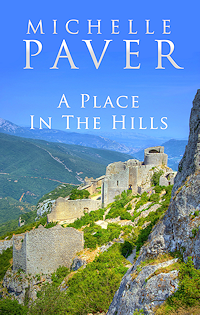A Magnificent Obsession
 Authors often suffer from “Second Book Syndrome” – after a promising debut, the next book is both challenging to write and harshly judged against the first. In Michelle’s case, there were no such worries. “Glorious storytelling!” enthused Sarah Broadhurst in The Bookseller, picking A Place In The Hills as one of the Big Name Paperbacks of the Year… “A big, sweeping drama for all ages. Michelle Paver is definitely a star in the making. This is the sort of book you curl up with and hope it never ends. Great!”
Authors often suffer from “Second Book Syndrome” – after a promising debut, the next book is both challenging to write and harshly judged against the first. In Michelle’s case, there were no such worries. “Glorious storytelling!” enthused Sarah Broadhurst in The Bookseller, picking A Place In The Hills as one of the Big Name Paperbacks of the Year… “A big, sweeping drama for all ages. Michelle Paver is definitely a star in the making. This is the sort of book you curl up with and hope it never ends. Great!”
Here, Michelle answers some of the most common questions from readers about this very special book.
A Place in the Hills is based on an original idea: it tells of two parallel love stories taking place more than two thousand years apart. Whence the inspiration?
[pull float=”alignright”]”This is the sort of book you curl up with and hope it never ends!”[/pull]It began as a piece of wish-fulfilment. For some reason I’ve always loved the idea of having a real, palpable connection with someone in the distant past. So I was thinking about an archaeologist heroine who tries to solve a riddle about a famous Roman. The idea of the two love stories developing in parallel only fully emerged after the planning stage, when I’d begun writing the book. And as it seemed to make the whole thing richer, I went along with it. That sort of unexpected development is one of the exciting things about writing.
The two love stories impact each other dramatically across the abyss of two millennia, and the final scene’s long-awaited libation for the souls of long-dead lovers is a spectacular climax to an extraordinary tale. Are you trying to make a statement about time here?
Not at all, I’m far more interested in simply telling a story than in making statements. But the odd thing is that the subject of time does keep cropping up in whatever I write, so obviously it holds a fascination for me. Perhaps it’s more accurate to say that I use writing as a way of asking questions, of the `what if?’ variety – and then seeing where the story will take me.
The love story of the star-crossed Roman lovers begins under unlikely circumstances – at a religious festival which you depict with extraordinary vividness. We’re right there in the sun-scorched streets of Rome, in the midst of a frenzied crowd led by self-mutilated priests! It is here that a young noblewoman catches sight of an imposing Roman officer and… the rest is history (no pun intended)! How do you come up with such inspired scenes? Do you construct them as you sit down to write, or do they just spontaneously unfold in your imagination?
“I’m far more interested in simply telling a story than in making statements…”[/pull]It’s hard to say which comes first, the characters or the scene – but quite often, as with the Cybele festival, it’s a mixture of both. I already knew what sort of people my characters were, and then in the course of my Roman research, I chanced across this extraordinary festival, and that seemed a great place for them to meet for the first time – because, being the sort of the people they are, they’d both be drawn to it. Then I learned about the Day of Blood, which was part of the festival, and it fitted beautifully with other aspects of the plot, so things began to fall into place. (Spookily, and without even being aware of it, I sat down to write the first chapter on the Day of Blood itself, which is the twenty-four of March. Of course that was nothing more than a coincidence, but I chose to take it as a good omen, in true Roman fashion!)
The plot is driven by the magnanimous actions of the enigmatic Roman poet/general Cassius. We learn much about his character through excerpts from his poems, which reveal a passionate and tender soul under a stoic exterior. After finishing the book, a number of readers expressed an interest in learning more about Cassius’s verse. Unfortunately, his poems are difficult to come by these days. Can you recommend your favourite edition?
I’d love to, but I’m afraid I made up both Cassius and his poems – although anyone reading the luminous poetry of Propertius and Catullus will see where I got much of my inspiration. There is however some precedent for certain of the events in Cassius’ life, in the life of a little-known Roman poet, Gaius Cornelius Gallus, who lived at about the same time as Cassius, was also a soldier as well as a poet, and also fell foul of the authorities, for reasons unknown today. Only a line or so of his poetry has come down to us, although he was extremely highly regarded by other Latin poets whose work has survived. (I should add that Cassius became very real to me as the story progressed, particularly when, in the course of my research, I went up to the British Museum one day, and came face to face with him. It’s actually a bust of an unknown Roman, but as soon as I saw it, I knew it was Cassius. Since then I’ve been back several times to visit him.)
Towards the end of the book, Cassius expresses a belief in an afterlife. When his lover questions his seemingly unshakable certainty, he responds: ‘It took me years to realize that what I felt for you – what I feel – is all the proof I’ll ever need.’ Is he somehow implying that the human capacity for enduring and selfless loves is, to use a Wordsworthian phrase, an intimation of immortality?
That’s clearly what Cassius believes, and it’s interesting that I wasn’t aware that he felt this way when I started the novel; it became apparent as I got to know him better. But is it also what I believe? I’m really not sure. Of course, one could argue that it must be what I believe, since I created Cassius – but I don’t think it’s that simple.
Continued on page 2…
